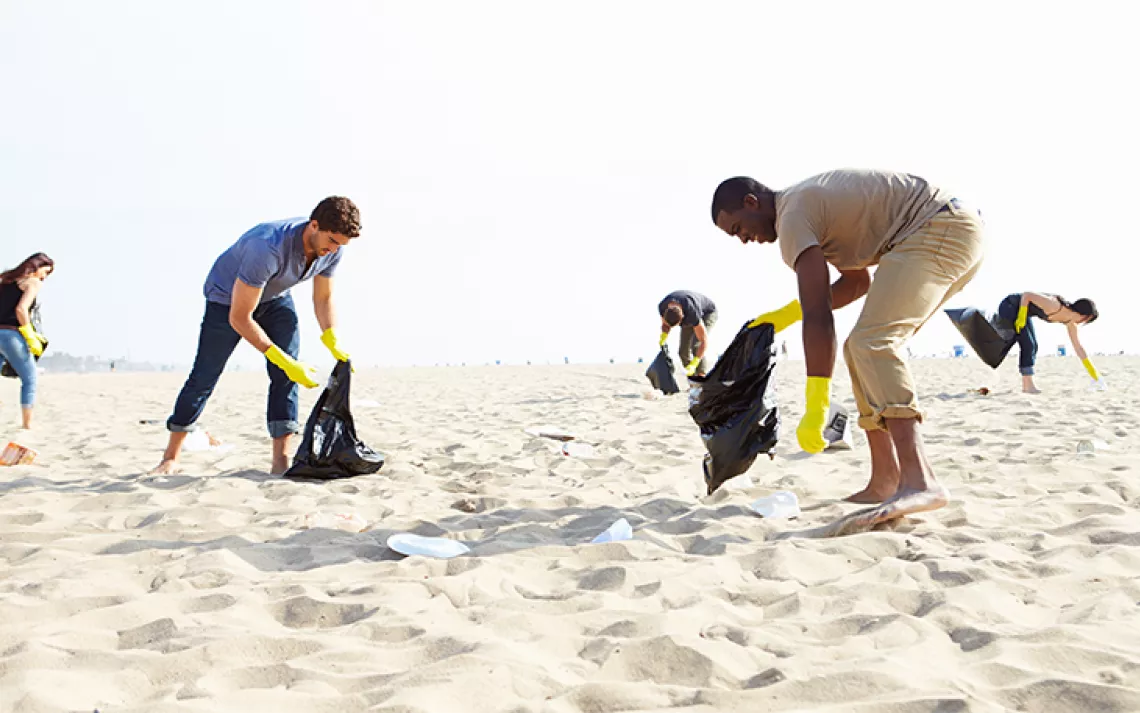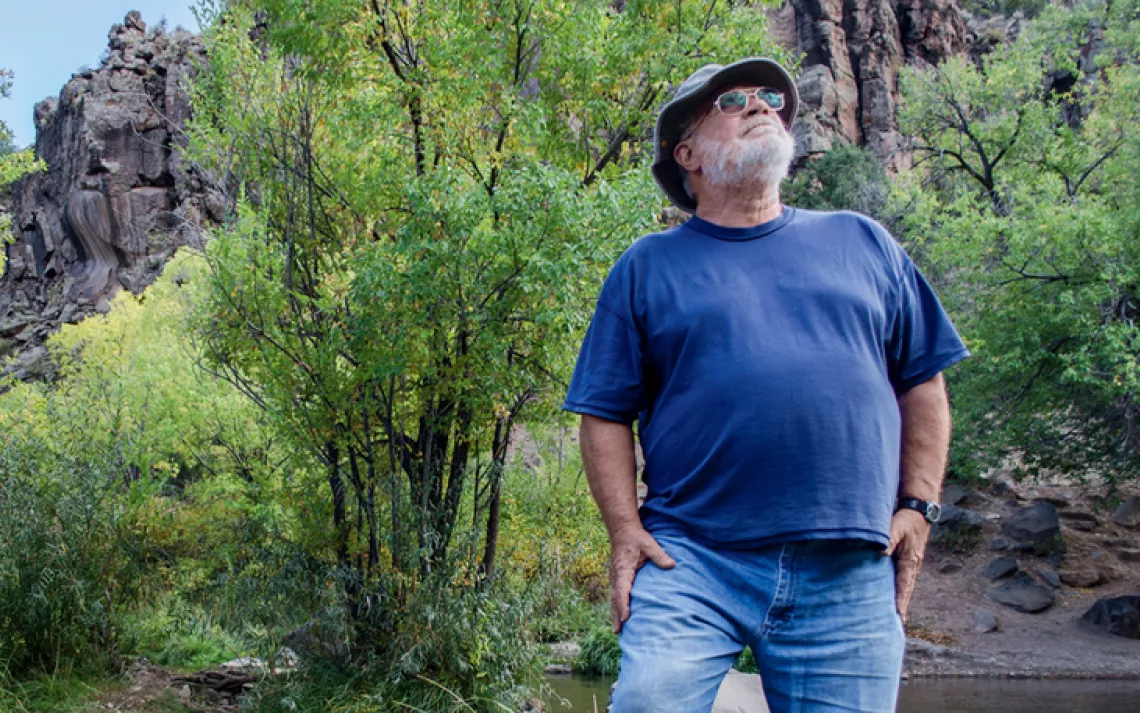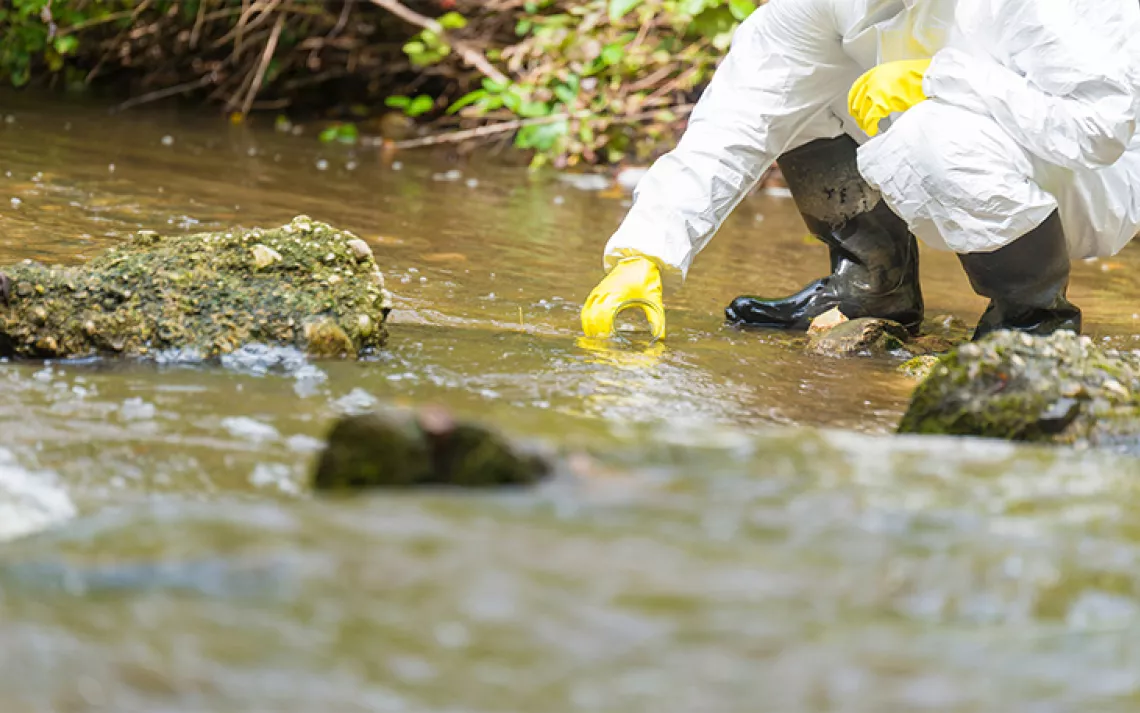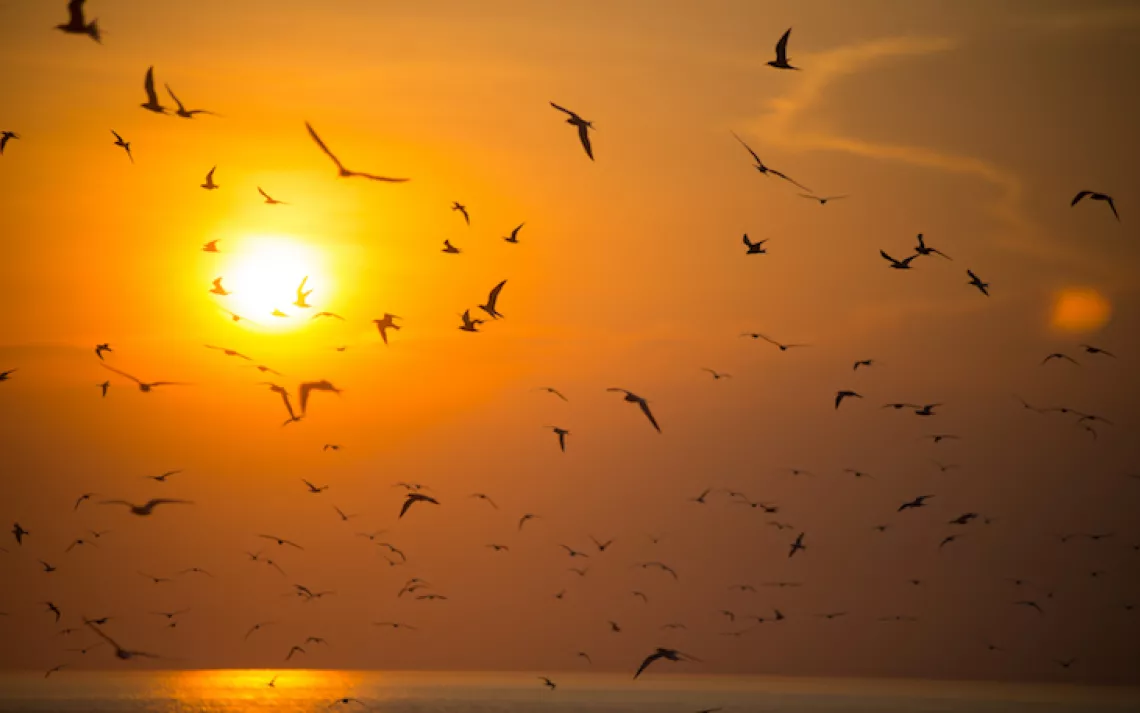Meet Allison Chin, Sierra Club Trailblazer
The former president has made an indelible mark on the organization
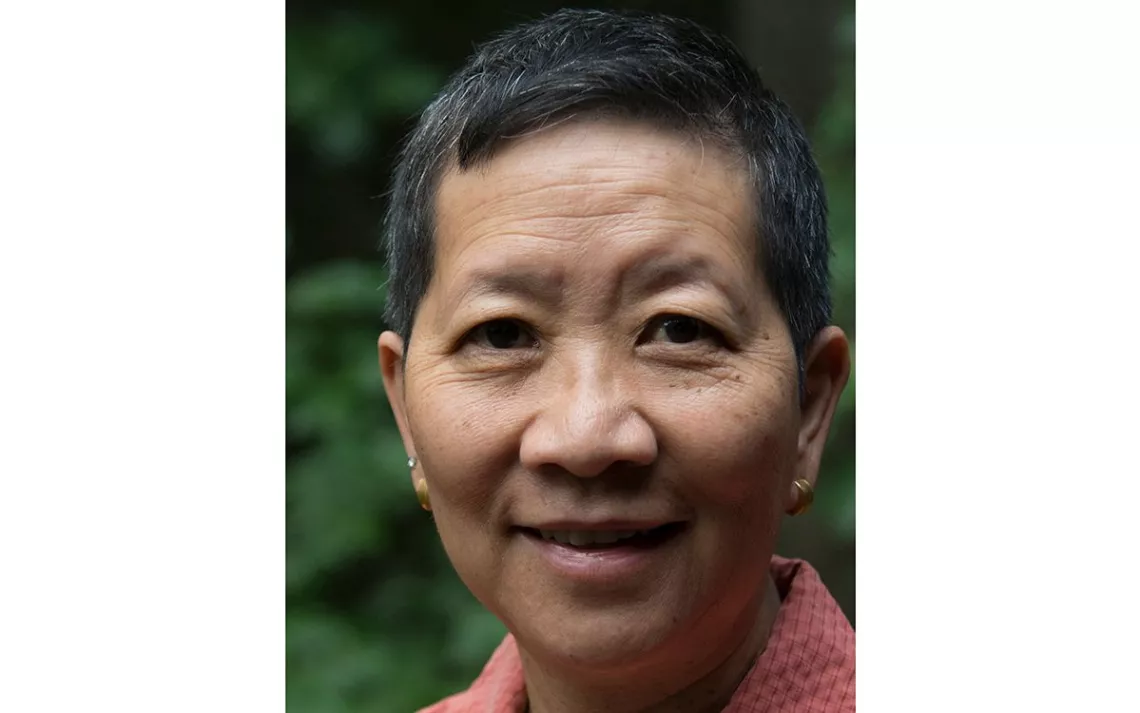
Allison Chin | Photo by BS Baker
Allison Chin is a self-described devoted Sierra Club volunteer. To those who have worked with the former board president, that’s a dramatic understatement. They see Chin as a trailblazer on whose shoulders they stand in the ongoing pursuit to make the Sierra Club a more equitable, inclusive organization.
A second-generation Chinese American, Chin became an environmentalist long before joining the Sierra Club. While growing up, they (Chin prefers they/them pronouns) and their family went camping every summer in Sequoia and Kings Canyon National Parks, where they explored by day with their siblings and cousins and fell asleep each night under the stars. The parks, with their crisp air and rushing water, became a childhood solace for Chin.
“It just left an indelible place in my own body for being outdoors,” they say.
Chin joined the Sierra Club in the early 1980s to help defend their beloved public parks against attacks by then–secretary of the interior James G. Watt. Not long after, they became an Outings leader with the San Jose Inspiring Connections Outdoors program—then called Inner City Outings—to share that love of the outdoors with others.
Chin started leading ICO trips for middle- and high-school kids in 1988 and continued to lead trips for the next 20 years. Over those two decades, while also working full-time in the biotechnology industry, they became a local ICO leader and soon took on volunteer leadership positions at the national level in the Sierra Club’s ICO and outdoor activities programs.
As a trip leader, Chin helped countless newcomers to the outdoors experience a sense of belonging. Of particular magnitude were the opportunities to encourage young hikers who didn’t think they could complete challenging trails.
“It may be as simple as, here, take my watch. Let's walk for 10 minutes and rest for a minute. And we just do that over and over again, and all of a sudden, someone did the trail, and the pride in being able to accomplish that, when maybe they hadn't had lots of opportunities to be on trails, to be hiking, to climb,” Chin says.
When Chin began volunteering in the 1980s, most ICO participants were from communities of color, while nearly all of the Outings leaders were white. Though Chin themselves felt welcomed and supported as an Outings leader, that disconnect inspired them to advocate for the Sierra Club to not only reflect underrepresented communities, but to truly include them.
Chin carried their ICO experiences with them as they rose all the way through the volunteer ranks and, in 2008, became the first Asian American and first person of color to serve as Sierra Club president. Their vision is of a Sierra Club that celebrates the cultural diversity of its members and the many different ways in which people connect to the outdoors—a Sierra Club that encourages learning along with forgiveness for the mistakes that inevitably accompany it.
“In our very mission statement, it talks about educating and enlisting humanity to protect and restore the quality of the natural and human environment,” Chin says. “I think that is a statement that has really helped the organization to reflect on who we are, what we do, and how we do it.”
As president of the Sierra Club board of directors from 2008 to 2010 and from 2012 to 2013, Chin pushed the board to meet the needs of the moment, championing equity, inclusion, justice, and organizational growth. Under Chin’s leadership, the board voted to support a pathway to citizenship for undocumented immigrants and suspended its long-standing ban on civil disobedience as Sierra Club members protested against the Keystone XL Pipeline and demanded immediate climate action.

In 2013, Chin was arrested along with other leaders for protesting the Keystone XL Pipeline at the White House. | Photo courtesy of the Sierra Club
“If we root our work in equity and justice, the work itself will attract a community of leaders that reflect the places where our work is, our lives are, and our people are,” Chin says. The question Chin continues to grapple with is, “How do we have a bigger ‘we’?”
Chin left their biotechnology career to serve as Sierra Club president, and they’ve remained in full-time volunteer positions since then. But their past work, developing therapeutics for cancer and age-related diseases, shares a common theme with their volunteer work: trying to support unmet needs.
Along the way, Chin learned the importance of date nights. They and their partner of nearly 30 years were both “sort of workaholics in our respective realms,” Chin says. Their partner, who passed away in 2018, was a professor of genetics at Stanford. While the two often supported each other through the complex demands of their careers, they committed early on to an ongoing date night, setting aside the work of the day to focus on being together.
As Chin worked to transform the Sierra Club, they found themselves growing too. That growth was often in partnership with Sarah Hodgdon, a 12-year Sierra Club employee who became the Sierra Club’s national program director in 2009. Hodgdon now works as a partner at the Management Center, coaching progressive nonprofits on equity and sustainability.
Early on, Chin asked Hodgdon to work with them on equity. Hodgdon focused on staff; Chin, on volunteers.
“I remember sitting with Allison one time, and we had a blank piece of paper, trying to develop a plan, turning the paper around and around,” Hodgdon says. “We were like, ‘What do we do?’ It just felt like it was such a big task to figure out how to transform the organization—like, where do we even start?”
They didn’t come up with a plan that day. But with the help of dozens of others and over the course of several years—and while simultaneously developing equity plans with individual departments and chapters—Chin and Hodgdon crafted the Sierra Club’s first multiyear equity plan.
That plan, a road map for moving the Sierra Club toward becoming a more inclusive organization, allocated resources toward many previously underfunded equity goals while also introducing new ideas. It was adopted by the board of directors in 2015 and has seen continued investment and implementation in the years since.
“When people start doing equity work, you have to really be open to changing, and you have to be open to the organization transforming, and that can be uncomfortable,” Hodgdon says.
Chin responded to that discomfort with education. Drawing from the skills they developed as an ICO leader, they took an encouraging, invitational approach to difficult conversations.
“I love facilitating conversations with other people, whether it's a learning space or training space, just to dive deeper into what we individually understand, what others on our team—to understand their perspectives more deeply, and then to ideally arrive at some shared understanding,” Chin says.
Chin is a celebrated mentor known for being collaborative, supportive, and unafraid to challenge others’ ideas. They are a thought partner who “people feel comfortable being messy with,” says Brittany Harris, a senior manager of strategic implementation at the Sierra Club.
For many staff members, including Harris, Chin’s support has been instrumental. Harris started at the Sierra Club in 2017 as an equity trainer. Chin served as her department’s volunteer co-lead.
As a Black woman whose job includes educating Sierra Club members—who are predominantly white—about race, Harris has often faced people unwilling to openly discuss issues like white supremacy, antiracism, and implicit bias. In many of those moments, Harris has gotten a call or a text from Chin asking, “Do you want me to come?”
Chin wants to make sure that “I don't have to always bear the burden of doing the intervention by myself,” Harris says.
Together, Chin, Harris, and others have established learning spaces for both national and chapter staff around race, oppression, power, and privilege.
Chin remains an active volunteer leader, though their work now extends beyond the Sierra Club. They are a cofounder of the Green Leadership Trust, a network of BIPOC leaders serving on the boards of environmental conservation organizations, and a board member of Training for Change, which helps frontline social justice groups facilitate educational spaces, among others.
Despite their storied and ever-growing legacy, Chin is quick to credit others for any progress the organization has made. “This work started well before I joined,” they say. “I stand on the shoulders of those who came before me.”
And now a new generation of Sierra Club staff and volunteers stands on theirs.
“This organization would not be as far along our equity journey,” Harris says, “if it would have not been for Allison Chin’s commitment.”
 The Magazine of The Sierra Club
The Magazine of The Sierra Club
